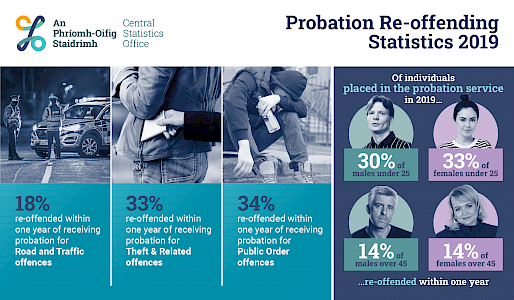18th December 2023
Statistics have been published by the Central Statistics Office (CSO) on rates of reoffending for individuals sentenced to probation in 2019 within one year of the date of their probation sentence, and individuals sentenced to probation in 2016 within 3 years of the date of their probation sentence. For more on how recidivism is measured by the CSO, visit the CSO website.
The data indicates that there has been a slight decrease in rates of reoffending from the previous year, standing at 25% in 2019 as opposed to 28% in 2018. This was the lowest rate of re-offending within one year since 2008.
Under one-third (30%) of young male adults (aged under 25 years) who received probation orders in 2019 re-offended within a year of receiving probation. In comparison, slightly more young adult females (33%) who received probation orders re-offended during the same period. The analysis also shows that the re-offending levels amongst adult males under the age of 25 fell by six percentage points between 2018 (36%) and 2019 (30%).
There was a strong reduction between 2018 and 2019 in the re-offending rate of persons serving probation for offences related to Burglary. In 2019, 24% were linked to a re-offence within one year of receiving probation compared with 33% in 2018.
Regionally, the highest level of re-offending (29%) involved probationers from the South-West (Kerry and Cork) region. In the Dublin region, where the highest number of probationers lived (1,978 of 5,644), 23% of probationers re-offended within a year.
The highest number of probation orders were issued in 2019 to persons who committed offences related to Road & Traffic offences (987 of 5,644). Just under one-fifth (18%) of these persons were convicted of a re-offence within a year of receiving their probation.
The three-year probation re-offending estimates provide a more comprehensive estimate of the levels of re-offending. To calculate this rate, the CSO needs a minimum of three years to establish a re-offending incident and a further two years to allow for the associated court conviction to elapse. During a longer period (three-years) after receiving a probation order in 2017, nearly half (47%) of persons committed at least one offence for which they received a conviction. The second offence may have been in different crime category to their first offence. This was one percentage point down on 2016 (48%) and eight percentage points less than 2008 levels when the three-year re-offending rate was more than half (55%).





Respect for rights in the penal system with prison as a last resort.